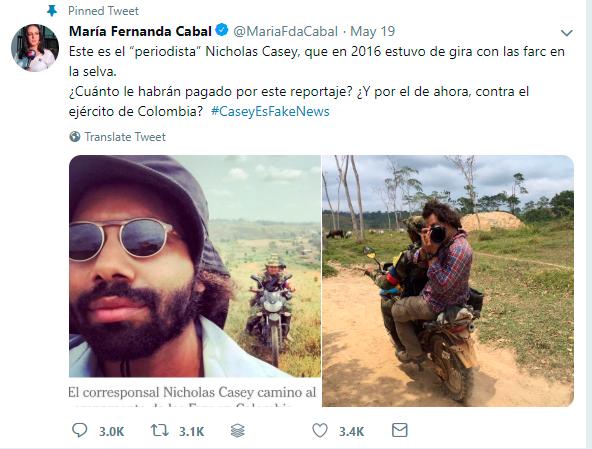BOGOTA: New York Times reporter Nicholas Casey said Sunday he has left Colombia amid controversy over a story of his on its military and what he called false allegations from pro-government parties.
The Times Andean bureau chief penned an article entitled Colombia Army’s New Kill Orders Send Chill Down Ranks, putting some in Bogota and among government allies on the defensive. Colombia, currently under a conservative administration, is a close US ally.
“The head of Colombia’s army, frustrated by the nation’s faltering efforts to secure peace, has ordered his troops to double the number of criminals and militants they kill, capture or force to surrender in battle – and possibly accept higher civilian casualties in the process, according to written orders and interviews with senior officers,“ Casey’s story said.
It was enough to alarm lawmaker Maria Fernanda Cabal of the party of Colombian President Ivan Duque.
Cabal posted photos of the Times story on Twitter and wrote “This is the ‘journalist’ Nicholas Casey, who in 2016 toured with the FARC (rebels) in the jungle. How much could they have paid him for this story? And for this one he just wrote against the Colombian army?”
The message quickly went viral, with lawmakers and military people joining in.
Casey said he would remain outside the country amid the purportedly untrue allegations.
The Times has stood by its reporter and said it reports accurately and based on documents as well as information from military staff.
Human Rights Watch’s director for the Americas, Jose Miguel Vivanco, said “these practices (by the army)suggest that the current Army and the Ministry of Defense have learned nothing from one of the darkest chapters in Colombia’s history, that of false positives, which puts the civilian population at serious risk”.
The reference is to so-called “false positives” – a practice used by the authorities between 2002 and 2008, under the government of then president Alvaro Uribe, Duque’s political cohort. It referred to executing people – anyone – and using their bodies to boost the toll of rebels killed in army clashes with rebels.
More than 3,000 people are believed to have been killed in this situation, according to Human Rights Watch. So far, 961 military staff have been prosecuted for the offense, official data show.
Colombia, the world’s leading producer of cocaine, is emerging from a half century of bloodshed, fought by guerrillas, paramilitaries, state agents and drug traffickers, with more than eight million people killed, missing and displaced. — AFP














